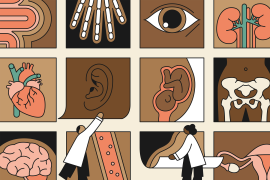In this Ask the Expert column, we talk with Jocelyn Guyer, co-executive director of the Georgetown Center for Children and Families, about the opportunities and challenges for states to improve the quality of children's health care presented by the Children's Health Insurance Program Reauthorization Act of 2009 (CHIPRA) and the newly passed health reform law.
In CHIPRA, what provisions or programs do you feel are the most important for advancing the quality of health care for children? Why?
The 10 new grants around quality and health IT are creating renewed excitement and interest in quality. They put quality on the table again, and brought a level of attention to child-specific quality measures that they have not received since CHIP was enacted. Between the grant process of defining a strategy, goals, implementation steps, and the grant funding, CHIPRA is helping states look at quality issues in greater detail.
Are there parts of CHIPRA that have potential to influence the quality of care in public programs more broadly?
Yes! The language in CHIPRA was carefully chosen. It requires states to increase reporting in outreach and enrollment, and specifies expanded quality reporting, such as the use of the Consumer Assessment of Healthcare Providers and Systems (CAHPS) survey on how patients experience care for Medicaid as well as CHIP. CHIPRA is structured to naturally bring in both Medicaid and CHIP for most provisions.
Does CHIPRA change the role of CMS, or the federal government overall, in child health care quality? How?
I think that CHIPRA represents a major ramping up in the federal government's role in quality improvement in children's health care. This is the first time we're seeing such extensive thought about this issue and funding at the federal level. We're in new territory. This administration is particularly receptive to efforts to make sure that public programs work well for children.
What does the passage of national health reform mean for CHIP and children's health more broadly?
Now that reform has passed, it will be more important than ever that we push forward on quality improvement in children's health care programs. Reform will raise the expectation that people can get coverage. Reform will also change the landscape and allow Medicaid to create family-based coverage, with a significant amount of new federal funding. It will be important to make sure children are well served.
What challenges do states face regarding CHIPRA and health reform?
It's a tough environment for states. With the current economic situation, most states are hunkering down until their budgets are better. But state-based policymakers from both sides of the aisle are really interested in high-quality health coverage for children, so as their budgets improve, we'll likely see greater take-up on the CHIPRA outreach and quality improvement options.
I worry that states will be under so much pressure to implement the new reform provisions, especially with so many state agencies short-staffed, they may leave some opportunities for enhancing children's coverage and quality of care by the wayside. We need to make sure that doesn't happen.


